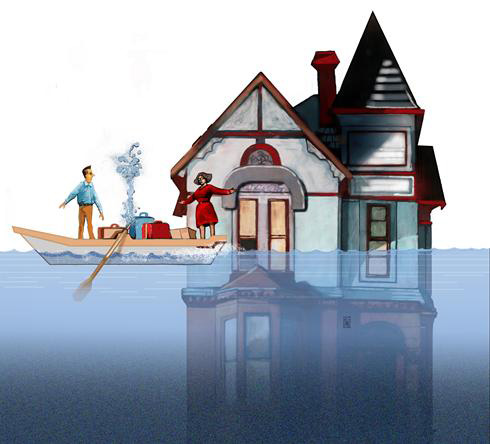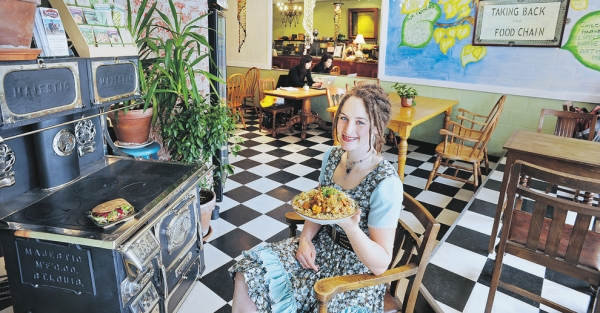Stephanie Armour
USA Today
When Jennifer and David Wakefield bought their home at the end of 2005, they believed its value would rise. After all, the couple they had bought it from made a $100,000 profit in just three years.
But instead, the housing market foundered, and the house in Oviedo, Fla., that the Wakefields bought for about $230,000 is now worth just $115,000. Jennifer Wakefield says she’s put off hopes of moving to a larger home. She once thought she could use a home-equity loan to help cover the $30,000 cost of adopting a child, but now there’s no equity to tap into.
“We’re in the middle of adopting our first child and would have loved to have used a home-equity loan to borrow from — if we had home equity,” says Wakefield, 32. “Now, we’re faced with coming up with $30,000.”
The Wakefields are among the owners of more than 11.3 million homes nationwide that are now worth less than the mortgages on them. The housing market collapse wiped out about $7 trillion in housing value from the third quarter of 2006 through the end of 2009, according to the Federal Reserve.
Gone are the days when households relied on their homes’ ever-rising values as family piggy banks that would pay for everything from new cars to college tuition. Legions of borrowers who once thought they could count on equity in their homes as a financial safety net are finding there’s nothing there. Instead, they’re discovering it may take years before their homes are worth as much as they owe on them.
A typical borrower who is “underwater” won’t see positive gains in equity until 2015 to 2020, depending on the market, according to a study of 10 major metro areas by First American CoreLogic for USA TODAY.
“It’s a rude awakening. There’s a total change in thinking going on,” says Amy Bohutinsky of Zillow.com, a real estate website. “People got caught up in the idea you could borrow against your homes, but they no longer think of them as savings accounts. We’re going through a big psychological shift. Will this recession change how we think about our homes? Are they an investment vehicle or a place to live?”
Vanished home equity is hurting young homeowners, who are finding they can’t relocate for jobs or promotions, and older borrowers, who are realizing they don’t have equity to tap for retirement.
‘What if I want to move?’
At 39, Tage Woehl already fears for his family’s financial future.
Woehl, of Eastlake, Calif., is about $80,000 underwater on a home he and his wife, Imelda, bought for $430,000 in 2003. He’s locked into a 5.99% fixed-rate mortgage that no bank will refinance.
To hold down other expenses, the Woehls go without cable TV, and he’s holding onto his 1999 Dodge Intrepid, which has 188,000 miles on the odometer. The Woehls‘ daughter, Nika, is only 4, but Woehl, an accountant, already is worrying about how he’ll afford college tuition in 13 years. He says he feels like he’s lost his financial life jacket: “It’s not too comforting.”
Woehl says it sometimes feels unfair that other homeowners who don’t pay their mortgages on time get federal bailout assistance in the form of mortgage modifications and lower monthly payments.
“I’m the one who’s paying every month, and when all is said and done, I’m scraping by,” he says. “We can’t refinance. We’re upside-down now. What if I want to move? I’d like to be closer to my job.”
But it’s also older borrowers without young children who are frustrated by their financial situation and feel stuck because they are underwater on their homes.
Vicky Dicristo, 64, bought her home in Soquel, Calif., in 2006 for $535,000 with plans to fix it up, live in it awhile, then sell and buy a nice retirement home in Arizona, where she has family. She bought the home with a five-year, interest-only, adjustable-rate mortgage at a 5.9% interest rate.
Her home is now worth $350,000, according to the local assessor’s office. And Dicristo, who was laid off nearly two years ago from her job as a mortgage loan underwriter, has lost the $135,000 she put down on the house as well as the more than $15,000 she put into renovating the home with new floors.
“I lost $150,000,” Dicristo says. “I haven’t been able to make payments, either. I thought I was going to be able to sell it and move to a less expensive area. That had been my plan when I bought it, to move to someplace like Arizona and pay all cash. But that whole plan fell apart.”
Dicristo is in growing company. About 24% of all residential properties with mortgages had negative equity at the end of 2009, according to First American CoreLogic. That’s up from 10.7 million and 23% at the end of September.
Dicristo can’t sell her home and move, but she may be forced to leave. She no longer can afford the payments on her home and expects to be foreclosed upon.
She’s living on Social Security and unemployment and drawing $800 a month from her $200,000 retirement account, but she says she has no choice but to walk away from her current home.
Her credit score had been close to a sterling 800, reflecting the type of borrower many banks would lend to at low interest rates. Because she’s been unable to make her mortgage payments, she believes her credit score has sunk to about 500, a score that would make it difficult for her to get a home loan.
Dicristo’s state, California, is among the top five states where negative equity is most concentrated. But it’s not in the lead. Nevada had the highest percentage of negative equity with 70% of its mortgaged properties underwater, followed by Arizona at 51%, Florida with 48%, Michigan with 39%. California came in at 35%, according to First American CoreLogic.
For Dicristo, losing equity in her home has meant losing the cash she sank into it and losing much of her retirement dream.
“Emotionally, this has had a very big impact on me,” she says. “It’s changed how I view housing.”
When foreclosure looms
Losing equity has also cost Henry Oviedo, 75, an engineer, his retirement dream.
He bought his home in 2005 in Owings, Md., for $642,000. It did not have a complete basement, so he spent nearly $100,000 to put in an office, a small theater, a bathroom, a fitness room and a big living room. He took out a five-year, adjustable-rate mortgage at 5.85% interest.
When he went to refinance recently, his home was appraised at $590,000.
Oviedo says he has been unable to get his home refinanced because he is upside-down. Nor has he been able to get his mortgage modified. Oviedo is now paying $3,200 a month, but come November, he could face higher payments when the 5.85% rate on his mortgage will be adjusted.
He must retire this year, and Oviedo says his Social Security check won’t be enough to pay his mortgage. His wife, Giselda, is unemployed.
“I am very worried,” he says. “I put $100,000 into the house. It’s very uncertain what is going to happen. I would have liked to have had this as my home in retirement, but I am going to have to go into foreclosure.”
The problem of negative equity is getting worse. The average equity amount that an underwater borrower was in the hole for in the fourth quarter of 2009 was $70,700, up from $69,700 the previous quarter.
Without equity in their homes, many homeowners no longer have collateral for personal loans that financed new cars, vacations, home improvements and college educations before the housing bust.
Home-equity lending has plummeted. Lenders made $77 billion in home-equity loans or lines of credit in 2009, down from $430 billion during the housing boom in 2006, according to Inside Mortgage Finance.
“That’s not likely to change any time soon until equity picks back up,” says Guy Cecala, CEO of Inside Mortgage Finance.
And as Americans wind up owing more on their homes than they’re worth, concerns are mounting that more may choose to simply walk away from their mortgages — a practice known as strategic default.
When the value of the mortgage is more than the value of the home, homeowners begin to show a willingness to strategically default on their mortgages, especially when the value has fallen by 15% or more, according to a 2009 study by researchers at Northwestern University, European University Institute and the University of Chicago. That could lead to more foreclosures and further depress home prices.
The negative equity problem also is threatening future inheritances. Many homeowners who counted on their home equity as a substantial part of the estate they’d pass on to their heirs are now worrying about the welfare of their spouses and children after they die.
Bob Riley had thought the equity in his home would provide for his wife, Dawn, and provide an inheritance for his three adult children. Now he fears it will just be a financial albatross for them.
His home is one of the 2.2 million in Florida with negative equity. He and Dawn, of Tallahassee, spent $220,000 five years ago and took out a fixed mortgage on their four-bedroom, one-story home that backs up to a lake and includes a 1-acre yard for their two dachshunds.
A nearly identical home across the street recently sold for about $180,000, and Bob guesses they’re at least $20,000 underwater on their house. He used to work as a concrete salesman but is currently out of work. Dawn sells insurance.
It’s frustrating, Bob says, because there’s a home they’d like to buy with more square footage that’s newer, but they’d have to write a check just to get out of their house. He says they’ve paid off all their bills and are now trying to decide whether to continue paying the mortgage.
“It’ll take years for the equity to get back,” he says.
Four or five other homeowners in his neighborhood, he says, have simply walked away and left their properties to the bank. And there are other hard realities to come to terms with.
Bob, 60, says he’ll have no home value to pass on to Dawn or his three grown children.
He had thought he could take out a reverse mortgage on the home. That’s when a homeowner who is older than 62 borrows money from his or her home. It isn’t paid back until the owner dies, sells the home, or permanently moves out.
“I can’t retire. I’m looking for work,” Bob says. “I thought whatever we’d have, I’d pass away and leave the house to her, and she’d have a reverse mortgage to live off of. Now we don’t know what we’re going to do.”








